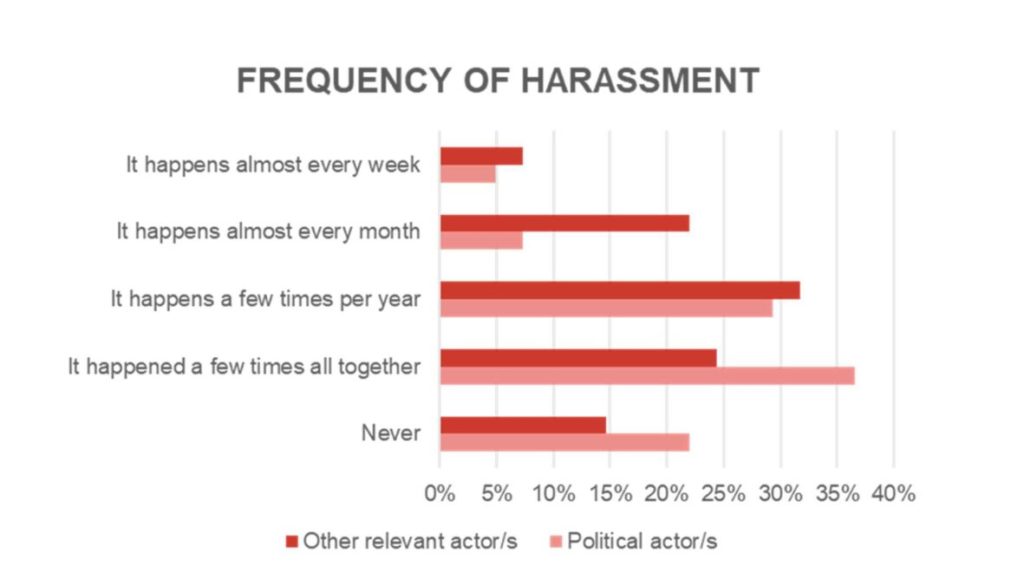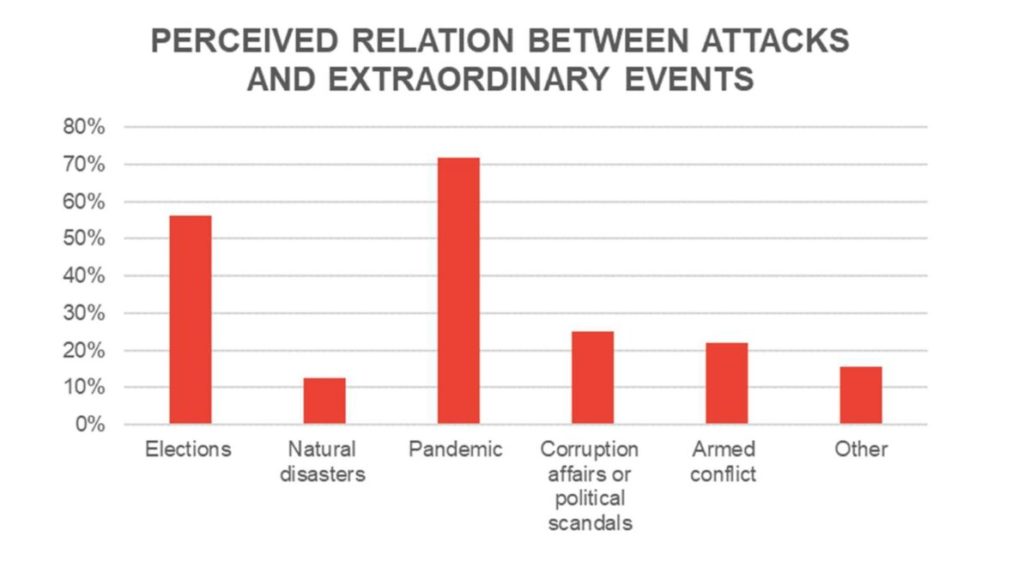Original article (in Croatian) was published on 07/06/2023
Fact-checkers are being intimidated by online harassment, insults and threats. The chase is led by public figures who spread disinformation.
Fact-checkers all over Europe are exposed to attacks, insults and threats, and the so-called SLAPP lawsuits, according to research conducted by Tijana Cvjeticanin for Faktograf.
The editorial offices of a total of 41 fact-checking media participated in the research. The most represented organizations are from Southern Europe; a total of 21 filled out the questionnaire, i.e. they make up 51 percent of the sample. Eight organizations each from Northern and Western Europe (20 percent of the sample) and four organizations from Eastern Europe (10 percent of the sample) participated.
90 percent experienced attacks
As many as 90 percent of organizations said that because of their work, they were the targets of public attacks by politicians or other public figures. Such attacks, which include threats, hate speech, insults and online harassment campaigns, are more common in Southern European countries, according to survey data.

It has also been shown that the intensity of attacks on fact-checking organizations largely correlates with events that have a significant impact on social life. Most fact-checking organizations point out that attacks on their journalists have become more frequent during the Covid-19 pandemic. Fact-checking media organizations also notice an increased intensity of attacks during pre-election campaigns.

Most often, the chase against fact-checkers is conducted on social networks, through direct communication channels such as e-mail or Facebook Messenger, and on the pages of marginal web portals. For now, harassment remains mostly virtual, and violence is verbal. Unfortunately, there are exceptions: four organizations experienced stalking of their journalists, three organizations reported cases of property attacks, and one case of physical violence was recorded.
The chase is led by public figures
Despite this, institutional protection of journalists in fact-checking media is lacking. More than two-thirds of the surveyed organizations report attacks to the police rarely or not at all. When explaining why, 52 percent of them state that they do not believe that the police will do anything with their report.
Public figures who fail to silence fact-checking organizations with threats and incitement of harassment, increasingly resort to the mechanism of judicial pressure. SLAPP lawsuits are a well-known way of trying to silence critical voices, and they are a favourite means of pressure for wealthier people, such as businessmen and politicians. The purpose of SLAPP lawsuits is to intimidate and exhaust the time and money of the defendants, mostly journalists and activists.
Among the organizations that participated in the research, 14 were sued, usually more than once. Plaintiffs are mostly persons whose claims were subjected to a factual accuracy check process and were assessed as incorrect. In most cases, they are public figures who are not political actors. Lawsuits against fact-checkers are also most common in Southern European countries.
The collected data correlates with the personal experiences of members of the editorial staff of Faktograf. We were often the subject of public attacks, during the Covid-19 pandemic we reported dozens of cases of threats of violence and death to the police, and we were exposed to a large number of SLAPP lawsuits. The attacks came from politicians from the extreme right, such as Nikola Grmoja, Stephen Nikola Bartulica, Zlatko Hasanbegovic, Nino Raspudic or Marin Miletic, but also from other public figures who use disinformation in the public space to promote their own agenda, such as the discredited scientist Gordan Lauc or the controversial entrepreneur Nenad Bakic.
A systemic problem
“Harassment of fact-checkers should be recognized as a systemic problem, with full awareness of the intentions to discredit both individual fact-checker media, as well as general efforts to suppress disinformation. Online platforms have long ignored the problems of harmful disinformation, and many continue to do so. This has created a sense among bad actors that they have the right to freely monetize hate speech and disinformation or use it as a weapon. As a result, fact-checkers who entered into a partnership with platforms after the mechanisms to combat disinformation were introduced were often seen as the only obstacle to monetizing disinformation or using it to mobilize support for political goals”, writes Tijana Cvjeticanin in the conclusion of her research.
She also presents a list of recommendations for better protection of fact-checkers from attacks and harassment. Large internet platforms (i.e. social networks) are thus encouraged to communicate more openly with journalists/fact-checkers about security problems in the digital space and to develop mechanisms for the protection of journalists, which includes adequate moderation of content in all languages.
Political actors are recommended to adopt legislative measures to protect journalists, including legislation to protect against SLAPP lawsuits, but also to promote media pluralism, freedom of information and professional journalism as a basic prerequisite for ensuring the quality of publicly available information.
You can read the entire research HERE.



